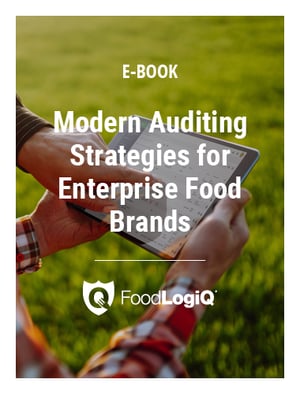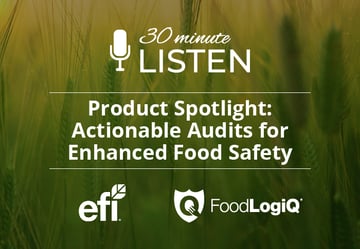Read FoodLogiQ’s latest E-Book, “Modern Auditing Strategies for Enterprise Food Brands,” to understand how to deploy successful food safety audits across your organization.
There is arguably nothing more important to a food organization than the continual quality and safety of the products created, served and delivered to their customers. Across industry verticals, food companies uphold brand promise and develop transparent, trusted reputations by repeatedly delivering on this quality. And reciprocally, they are constantly held to it. This reality applies across a variety of levels, from the regulatory realm, to supply chain partnerships, to individual consumers.
 Without an effective food quality and safety auditing program, poor quality can destroy your brand loyalty and send customers to competitors. However, at the same time, managing food quality audits has become increasingly complex with increased regulation in the food industry. Additionally, consumers are hyper-vigilant about the quality of the food they eat, and the visibility and transparency of the food companies that produce it for them. Consumers expect more than just a one-time positive experience with a product; they expect that same level of quality time and again. This is why auditing and managing the quality specifications of your products - to ensure consistent quality over time - is such a critical component to your brand.
Without an effective food quality and safety auditing program, poor quality can destroy your brand loyalty and send customers to competitors. However, at the same time, managing food quality audits has become increasingly complex with increased regulation in the food industry. Additionally, consumers are hyper-vigilant about the quality of the food they eat, and the visibility and transparency of the food companies that produce it for them. Consumers expect more than just a one-time positive experience with a product; they expect that same level of quality time and again. This is why auditing and managing the quality specifications of your products - to ensure consistent quality over time - is such a critical component to your brand.
As a result, enterprise food brands should take a variety of factors into consideration when devising and deploying modern food safety audits. From establishing a trusted food safety audit team to organizing required documentation, performing mock and internal audits, and more, there are many ways organizations can design and fortify strategic, preventive strategies to uphold food safety, quality and overall brand compliance.
Read “Modern Auditing Strategies for Enterprise Food Brands” to learn more about the factors your brand should consider before your next food safety audit.
Download the E-Book to Learn:
- The key elements of a successful, modern food safety audit
- How current food safety regulations and prevention strategies are shaping auditing strategies and formats
- What essential considerations to take when executing food safety audits
- The impact of technology on compliance and prevention methodologies
- How to strategically deploy internal, second or third-party audits, step-by-step
Tag(s):
Food Safety
Other posts you might be interested in
View All Posts
Food Safety
5 min read
| October 22, 2020
30 Minute Listen: Actionable Audits for Enhanced Food Safety ft. EFI
Read More
Food Industry
6 min read
| September 21, 2022
Five Steps to Prepare for a Food Safety Audit
Read More
8 min read
| March 26, 2021

